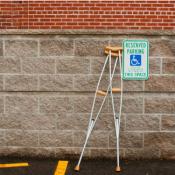 This evening my local newspaper contained this sad headline: “Maryland couple found dead at home.” A husband and wife, both aged 72, died in an apparent murder-suicide. The wife reportedly had a stroke a few years ago, and the husband’s health had recently deteriorated as well, according to the story. The article quoted friends of the family who said that while the husband was devoted to his wife, he had become overwhelmed by the demands of caregiving combined with his own health problems.
This evening my local newspaper contained this sad headline: “Maryland couple found dead at home.” A husband and wife, both aged 72, died in an apparent murder-suicide. The wife reportedly had a stroke a few years ago, and the husband’s health had recently deteriorated as well, according to the story. The article quoted friends of the family who said that while the husband was devoted to his wife, he had become overwhelmed by the demands of caregiving combined with his own health problems.
No matter the circumstances, this is a tragic story. While reading it, I couldn’t help but think about the difficulty faced by so many caregivers with whom I have worked. Each one expressed absolute determination to care for his or her spouse without assistance, believing that no one else could do it as well. The loyalty, patience, and nurturing care demonstrated by these individuals are admirable, perhaps even saintly. But nobody, even the most patient person on earth, is immune from the effects of putting someone else’s needs above one’s own day after day, week after week, month after month.
According to WebMD, caregiver burnout is defined as “a state of physical and emotional exhaustion” resulting from the one-sided nature of caring for someone who is chronically ill. The person who is sick does not intend to burden his or her caregiver, but the nature of being unable to care for oneself creates that one-sided dynamic. The spouse who is caring for the ill person may be happy to take on the responsibility of feeding, bathing, and taking his or her loved one to appointments, knowing that were the situation reversed, the other person would gladly oblige. Even so, constant caregiving for a chronically ill spouse can disrupt one’s life in multiple ways. Many caregivers are reluctant to reach out for help, which puts them at risk of burnout.
Help is out there! Caregivers do not have to feel alone.
According to HelpGuide.org, here are some of the signs and symptoms of caregiver stress leading to burnout:
- Anxiety, depression, irritability
- Feeling tired
- Trouble sleeping
- Increased health problems of your own
- Difficulty concentrating
- Increased feelings of resentment about caring for your ill loved one
If you feel that you may have some of these symptoms, please don’t wait to ask for help!
Fortunately, if a caregiver begins to experience some of these symptoms, it is not too late to make changes. The following self-care tips, from CareGiver.org, can reduce caregiver stress and lessen the risk for burnout:
- Practice stress-reduction strategies. Examples include taking a yoga class, learning deep-breathing techniques, meditating, praying, or chanting.
- Get plenty of rest.
- Maintain a routine including nutritious meals and a regular bedtime.
- Exercise! Walk, run, swim, stretch, or take a group exercise class at a local gym. Try to get a minimum of 10 minutes of exercise daily.
- Schedule time off from caregiving. Whether you ask for help from a family member, a friend, a neighbor, someone from your religious community, or hire someone from an agency, it is healthy to take a break.
- Ask for help. People who care about you and your loved one are likely to be glad to offer support.
- Reach out for support to help you with your feelings. Talk to your pastor, a trusted friend, or a counselor. Many communities have support groups for caregivers.
- Remember, you must care for yourself in order to care of someone else. There is nothing selfish about caring for your own health.
Your local department of aging/disabilities can guide you to the resources available in your community. It’s important for your chronically ill loved one that you are taking care of yourself while taking care of him or her. You can also find help here. The National Center on Caregiving has numerous outstanding resources to help you.
To find a therapist for help with caregiver issues/stress, click here.

The preceding article was solely written by the author named above. Any views and opinions expressed are not necessarily shared by GoodTherapy.org. Questions or concerns about the preceding article can be directed to the author or posted as a comment below.

 5 Factors that Contribute to Depression in Caregivers, Part I
5 Factors that Contribute to Depression in Caregivers, Part I 5 Factors that Contribute to Depression in Caregivers, Part II
5 Factors that Contribute to Depression in Caregivers, Part II Letting Go of Resentment and Anger As a Caregiver
Letting Go of Resentment and Anger As a Caregiver

Please fill out all required fields to submit your message.
Invalid Email Address.
Please confirm that you are human.
Leave a Comment
By commenting you acknowledge acceptance of GoodTherapy.org's Terms and Conditions of Use.